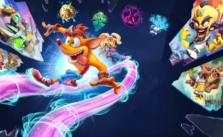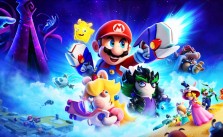Are Linear Single Player Games a Slowly Dying Breed?
Conceptually, linear single-player games have occupied players’ palms since the dawn of gaming. But somewhat inevitably, the devices themselves have transformed tremendously with each generational leap.
Yet, the simple premise of linear solo-centric campaigns remains relatively unshaken, residing as a robust cornerstone of the industry despite trending deviations.
At one stage, a small fragment of the industry seemingly foresaw traditionally linear single-player games as the last of a dying breed – destined to be eclipsed by the rapidly rising multiplayer market. Simply put, in recent years, the industry has increasingly sought to tilt the terrain in favor of more online integrated play, resulting in a seismic shift away from its more traditional offline roots.
Today, even titles solely intended for single-player typically include aspects of online integration. In this sense, Kojima’s Death Stranding, Rockstar’s Grand Theft Auto, From Software’s Dark Souls, and Naughty Dog’s The Last of Us immediately spring to mind.
So, for better or worse, its inclusion has become a staple part of the modern-day gaming package. Since its recent arrival on the scene, this ever-burgeoning trend has gradually reshaped and partly influenced the gaming landscape’s current trajectory. Meanwhile, opening the door to an uncharted online space of limitless connectivity. In adopting this model, the multiplayer market would soon balloon exponentially, experiencing unprecedented levels of growth. Yet, even armed with the benefit of hindsight, no one could have guessed how hugely monumental that move would become.
Despite all these triumphant successes, though, occasionally linear, single-player story experiences would continue to dominate the headlines, receiving significant recognition while scooping up credible silverware along the way.
Are Linear Single-Player Games Suffering or Thriving?
When remarking on the closure of Visceral Games, EA’s Chief Financial Officer Blake Jorgensen stated at the time, “people don’t like [linear games] as much today as they did five years ago or ten years ago.” (As reported by DualShockers)
I can painfully recall holding particular concerns for this newly trending line of logic. Even so, in no way had I envisioned a future gaming frontier solely structured around multiplayer. If anything, single-player games were continually producing some of the most creatively transformative works of art. Besides, never before had I been so impressed from both a visual and technical perspective.
In any case, the single-player category was already successfully established long before the likes of Remedy’s critical darling Control had even been granted conception. Naughty Dog’s The Last of Us series, for instance, was one of the first to break significant boundaries in the single-player category through its emotionally impactful storytelling and impressive cinematics. While elsewhere, Arkane Studio’s celebrated single-player stealth, action-adventure, Dishonored, combined gratifying gameplay cycles with immersive world-building.
Similarly, the Bioshock series has also experienced long-running critical success down the decades. So too has the iconic Deus Ex franchise with its spectacularly immersive science-fiction-themed titles Human Revolution and Mankind Divided. Though the latter seemingly suffered sales-wise.
Since those earlier days, however, the landmark arrival of the open-world genre has played a hand in broadening the scope and scale of single-player experiences. After all, we need only peer upon the future open-world pipeline of games with titles like Starfield, Horizon Forbidden West, and Avowed to fathom what the future holds. Thankfully, an upcoming sequel to the critically-acclaimed Plague Tale of Innocence alongside a promising Hellblade successor should help satiate our appetites for linear, single-player games. At least for now.
If not, well, we can always revisit our retro roots!
The Arrival of Games as Long-term “Live Service” Models
Meanwhile, the meteoric ascent of the multiplayer market, whose ever-rising stars include Apex Legends, Fortnite & PUBG, among many more, has paved the way, and in many ways, cemented the “live service” experience.
Now woven into the gaming industry’s genetic fabric, the live service formula has so far produced mixed results and is, as such, still very much an ongoing experiment in which studios have barely tested the waters. However, an unfortunate consequence of this format is that companies can potentially abuse the online-dependent player interface by slyly introducing monetization schemes and unwanted pay-to-win systems.
As technological capabilities take giant strides forward with each passing generation, the word linear is seemingly attributed to games far less frequently. But equally, we should also consider the possibility that using the term linearity in a contemporary context carries negative connotations. Not just through the creative specs of developers but also to those ultimately responsible for marketing the game to an increasingly demanding, ever-discerning audience.
After all, for studios wishing to harness and capitalize upon the true potential of modern hardware, perhaps more interest lies in maximizing space and scope through expansive open worlds rather than enforcing linearity and strictly focusing on specific aspects of story and gameplay. But for me and many others, linear single-player games are the sole reason we pick up a pad.
Why We Must Preserve Single-Player Linear Story Games
Why do I seek to preserve linear single-player experiences? Well, somewhat surprisingly, my motivations don’t simply revolve around some long-lost sense of nostalgia. After all, in over twenty years of gaming, it’s the linear single-player titles that have produced some of my most cherished experiences.
Deep down, I’d give absolutely anything to replay Solid Snake’s stealthy infiltration of Shadow Moses with a fresh set of senses. Likewise, I often reflect on how wonderful it felt to fill the shoes of Nathan Drake and embark on his swashbuckling quest for the Chintamani stone the first time over.
Finally, words don’t do adequate justice to the impact that Joel and Ellie’s touchingly poignant trek across a bleakly apocalyptic US had on my life. Since their inception, single-player linear games have given us so many special memories. And for that reason, I hope their stories continue to enchant and inspire gamers for many more years yet.
Do let us know your favorite linear single-player games in the comments.
-

Robbie is a lifelong gaming enthusiast who grew up in the glorious era of Goldeneye split-screen multiplayer. Although he's excited for Ragnarok, Robbie is often found delving back into his retro roots; entirely convinced Metal Gear Solid 1 and Ocarina of Time are masterpieces of equal merit.
View all posts
You May Also Like
 A Nostalgic Celebration of The Platforming Genre – Opinion Piece
A Nostalgic Celebration of The Platforming Genre – Opinion Piece
 Can Bloober Team Remake One of the Greatest Survival Horror Games of All Time?
Can Bloober Team Remake One of the Greatest Survival Horror Games of All Time?
 From Wolfenstein 3D to Doom: How id Software Popularized the First-Person Shooter
From Wolfenstein 3D to Doom: How id Software Popularized the First-Person Shooter
 Metal Gear Solid 2: 20 Years On – How Hideo Foresaw the Future
Metal Gear Solid 2: 20 Years On – How Hideo Foresaw the Future
 The Best of 2022: Which Games Came Out on Top?
The Best of 2022: Which Games Came Out on Top?
 TOP 5 New Upcoming Survival Games for late 2021 & 2022
TOP 5 New Upcoming Survival Games for late 2021 & 2022
 TOP 5 Post-Apocalyptic Games to Get Lost in 2022
TOP 5 Post-Apocalyptic Games to Get Lost in 2022
 TOP 5 Upcoming Nintendo Switch Games Releasing in 2022
TOP 5 Upcoming Nintendo Switch Games Releasing in 2022
 TOP 5 Upcoming Realistic Graphics Games of 2022
TOP 5 Upcoming Realistic Graphics Games of 2022
 TOP 5 Upcoming Strategy Games of 2022
TOP 5 Upcoming Strategy Games of 2022
 What A New Metal Gear Game Look Like | Opinion Piece
What A New Metal Gear Game Look Like | Opinion Piece
 Will Tears of the Kingdom Revolutionize Gaming (Again)?
Will Tears of the Kingdom Revolutionize Gaming (Again)?





